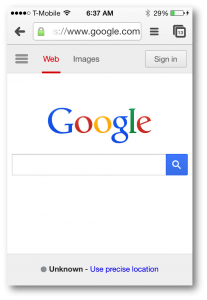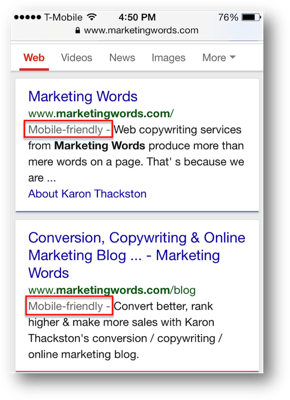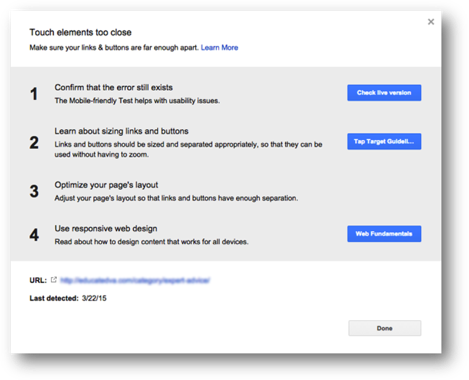Marketing Words provides copy and content designed to boost conversions, search rankings and sales. We don’t handle design issues. So why do I have a guest post from a design expert on my blog? Because Google’s mobile update is serious business that could potentially cause a lot of websites some very unexpected problems as of April 21st.
I’ve asked web design pro, Cindy Bidar of Digital Business Managers, to give us a layman’s explanation of the update and how it could impact WordPress websites specifically.
Please keep in mind that this is not a penalty. It is an algorithm change that will be in place indefinitely. It also only impacts your traffic from mobile sources. Depending on where your traffic comes from, it might not cause you a problem, but my guess is almost everyone’s traffic these days relies heavily on mobile sources (smartphones, tablets, etc.).
Cindy… enlighten us 😉
===================================================
 If you’ve worked with WordPress or have a blog, you’ve likely heard that “Google loves WordPress.” It’s often thrown around as an indisputable fact, and in some ways, it’s even true.
If you’ve worked with WordPress or have a blog, you’ve likely heard that “Google loves WordPress.” It’s often thrown around as an indisputable fact, and in some ways, it’s even true.
Matt Cutts, the head of Google’s anti-web spam team, agrees that WordPress “takes care of 80 to 90% of search engine optimization.” He’s talking about the mechanics, of course. That means that your WordPress site is easy for Google to access, and the information the search bots need to properly index a site is readily available.
But this April 21, some WordPress sites will find themselves on the wrong side of a Google algorithm change.
According to Google’s blog:
“Starting April 21, we will be expanding our use of mobile-friendliness as a ranking signal. This change will affect mobile searches in all languages worldwide and will have a significant impact in our search results. Consequently, users will find it easier to get relevant, high quality search results that are optimized for their devices.”
Significant Impact
 Google’s search algorithm is a closely guarded secret, with no one outside of the company knowing for sure just how much weight they place on any one ranking factor. So while they’re stating that the change will only affect mobile searches, there’s no way to be certain.
Google’s search algorithm is a closely guarded secret, with no one outside of the company knowing for sure just how much weight they place on any one ranking factor. So while they’re stating that the change will only affect mobile searches, there’s no way to be certain.
Unlike other algorithm changes though, Google is making it easy for you to know if you’ll be affected. Open up the browser on your cell phone, go to google.com and search for your website. If your site is mobile friendly, you’ll see a notation next to your listing that lets you know. If your site is listed as mobile friendly, you’re probably ok.
Do keep in mind though, that the mobile-friendly designation is applied on a page-by-page basis. So just because one page makes the grade, that doesn’t mean every page on your site will.
Get Monthly Blogging/Content Marketing Ideas by Email
Tired of trying to figure out what to write about all the time? Every month, you’ll receive an entire list of topic ideas complete with title suggestions as your free gift when you request the Marketing Words Newsletter.

I understand that I will also receive weekly articles & videos plus periodic discounts, product notices & more. I can unsubscribe at any time.
To get the whole picture, log into your Google Webmaster Tools account, and go to their mobile usability page. There you’ll find a list of pages that don’t pass the mobile-friendly test, along with the issues they found, and tips for fixing them.

Why Mobile Matters
According to Google, 94% of people who own a smart phone search for local information with it. Of those, 77% of searches are performed at home. So even when a larger desktop or laptop computer is available, people are using their phones for search.

Google has always said that their goal is to provide searchers with the most relevant results. If that searcher is on a mobile device, it only makes sense to offer search results that are useable and easily accessible from a smart phone or tablet.
What If Your Site Fails The Test?
Not mobile friendly yet? Don’t panic. You have options (and maybe more time than you think).
Chances are, if your site does not pass the mobile-friendly test, it’s because you have an older theme. Most modern WordPress sites are responsive (meaning the layout changes based on the size of the browser), so the first thing to do is look at updating your theme.
If your theme doesn’t have an available update, you can either install a plugin that will create a mobile theme on demand, or have your existing site recreated in a mobile-friendly format.
Here’s the good news though: Google has stated that this algorithm runs in real time. That means that as soon as Google crawls your new mobile-friendly site, you’ll begin to see the benefits–even if you’re not mobile friendly when the change rolls out. So it’s not a penalty from which you have to recover, but simply one factor Google considers when determining the order in which pages are listed in the results.
Does that seem like a small distinction? Here’s what you really need to know: don’t ignore it. With more and more website viewers doing their browsing on mobile devices, it’s critical that your site makes the grade.


